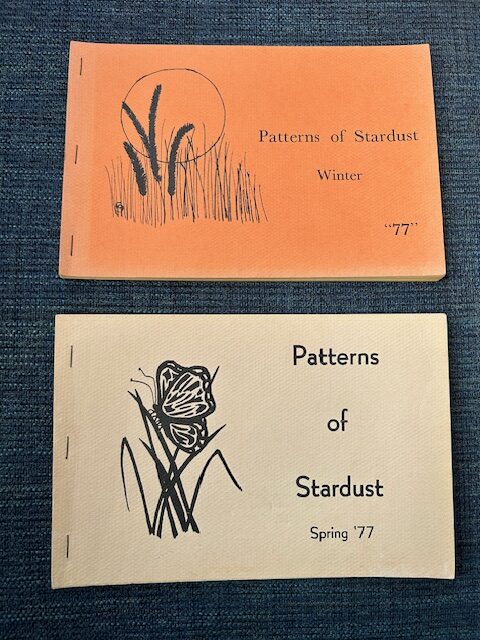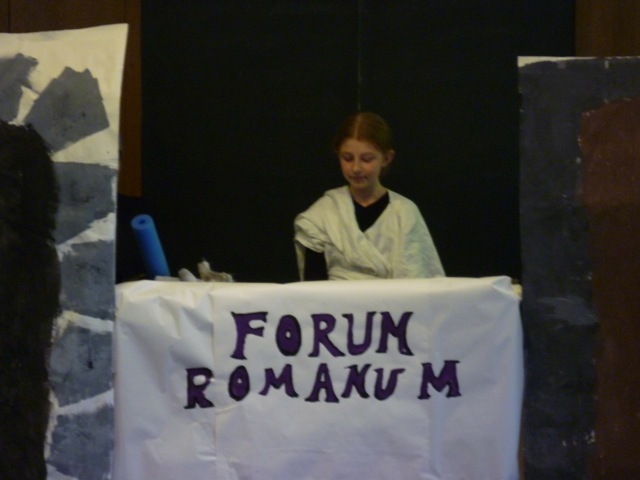
Julia is advancing as a Latin scholar much more quickly than I ever have. In fact, I have tried four times to learn Latin, and I still don’t have the endings memorized — and I am not sure I ever will. But I have learned to love the language.
The first time was in seventh grade. Because my family had just immigrated to Australia, my grade placement was called Form One. A school in Melbourne called Norwood High School offered a few foreign languages, and I took Indonesian and Latin for the one term I was there. I remember one two-sentence exchange in Indonesian (“Ini apa? Ini buku.” “What is that? This is a book.”), and I learned that in Australian schools of that time the top student was called “dux”, (from the verb, ducere, which means ‘to lead out’ and from which we get the English word ‘to educate’.) A ‘dux’ is perhaps a little like a valedictorian in a senior high school class. I thought it was weird, but that was the year I thought everything was weird because I had attended three different schools in a foreign country in nine months. The next school I attended was called Tintern Church of England Girls Grammar School. Though the year I was a student there I studied French, Tintern’s Latin motto was emblazoned on the school bags we carried: ‘Factis Non Verbis’ or ‘By Deeds Not Words.’ As a poet, this deeply annoyed me.
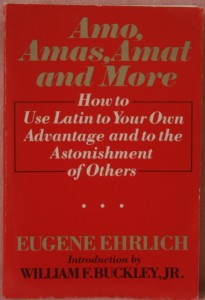
The second time I tried to learn Latin was the next time I moved to a school that offered it: West High School in Appleton, Wisconsin. There, for one year, I learned a little grammar and vocabulary, enough to slip notes to my best friend that said things like: ‘Magister porcus est.’ (‘The teacher is a pig.’)
The third time I attempted to scale the Latin language was for fun, not for grade or credit. I spent two years in a Master of Fine Arts program at McNeese State University in Lake Charles, Louisiana studying poetry, teaching freshman composition, tutoring in the remedial English lab, and working at the circulation desk at the library. Despite having no time, I jumped at the chance to move a little ahead with Latin when a gracious and generous teacher, Elaine Carlton, offered to teach a few of us graduate students for free. My progress was slow, but the clarity and beauty of the language was a restful oasis at a very stressful time of my life.
Fast-forward to 2006, the year Tim and I began homeschooling our then-first-grade daughter. Though Tim’s Latin was limited to dim memories of altar-boy phrases, his love of classical history was fierce. Julia was also keen to study languages and had already begun with French and Spanish while yearning for Greek and Middle Egyptian and Linear B. We all agreed that in constructing our own curriculum it would be a natural thing to build onto the romance languages she’d begun exploring, and Latin would be a stepping stone into languages of the distant past. I could help for a while. And materials for young children abound in both classical and medieval Latin, whereas they are rare indeed for classical Greek. Recently, I asked Julia what her favorite resources for Latin study have been, and her answers are summarized on the Latin page of the Homeschooling section of this website.
I will never be the Latin scholar that Julia is becoming, but often Latin is a hoot and takes me to surprising places. Latin has caused me to sing along at the celebrated St. Olaf College Latin play—the inspired brain child of Professor Anne Groton, combining English & Latin with Roman dramatic constructs and outrageous punning lyrics worthy of Gilbert and Sullivan (http://wp.stolaf.edu/classics/st-olaf-latin-plays/).
Latin compelled me to figure out how to cover an old, rectangular metal cake pan with a thick layer of beeswax (which smells heavenly) into a ‘tabula rasa’ and convert an orangewood stick into a stylus.
Latin history allowed us to add a layer to an arts & crafts/science project in 2008 when we built a papier-mâché volcano, painted it, and invited another homeschooling family to make it erupt (using a mix of baking soda, vinegar, and red food coloring). We added a tiny paper figure from a construction project–a-Roman-villa kit–to the vicinity of the volcano, called him Pliny the Elder, and transformed the nameless volcano into Vesuvius. (Unlike the historical Pliny, who rowed closer to the danger, our Pliny stand-in screamed, jumped up, and ran for cover many, many times. But alas; he, too, was toast in the end.)
Latin coaxed me, garbed in my bathrobe, onto a film, shown in public, to recap the role of the Forum Romanum (a series of Latin language newscasts created by The American Classical League) gentle weatherman, Aulus Serenus, (‘Fair Wind’) when a group of Northfield kids and parents put on our own double-header of a Latin play in 2010. (See the map below: I thought of a key line, ‘in Britannia, pluit, ut semper’ or ‘in Britain, it is raining, as always’ frequently during this wet, Minnesota spring.
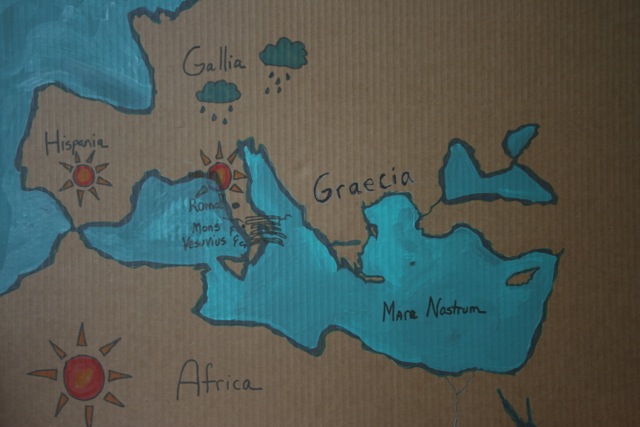
For our family, Latin sparks discussions and gives us hearty laughs surprisingly often. My favorite joke is a riff on Julius Caesar’s famous statement: it tweaks the pithy ‘Veni, vidi, vici’ (‘I came, I saw, I conquered.’) into ‘Veni, vidi, Velcro’ (‘I came, I saw, I stuck around.’)
We sometimes ask Julia to teach us new Latin words over dinner and enjoy imaging ways that Tim could employ Latin phrases in the corporate world. To this end, we’ve enjoyed the work of National Lampoon co-founder Henry Beard’s books, Latin for All Occasions and Latin for Even More Occasions (Villard Books, 1990 & 1991). For instance, under “For the Airport’, Beard suggests belting out “Recedite plebes! Gero rem imperialem!” when lines are too long (“Stand aside, plebians! I am on imperial business.”) The sounds, sentiment, and humor of this phrase caused me for a time to repeat it so often that I drove poor Julia to sighing, eye-rolling, and the occasional head clunk on the dining room table.
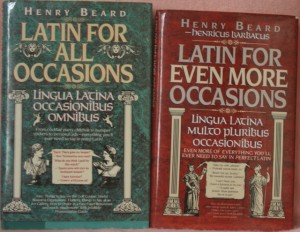
Another delight is seeing how a beloved children’s book is transformed by Latin. There aren’t enough of these, in my opinion. I would love to encounter the immortal Madeline or Where the Wild Things Are in Latin. But I do have Winnie Ille Pu translated by Alexander Lenard (Dutton, 1962) and Ferdinandus Taurus translated by Elizabeth Chamberlayne Hadas (David McKay Company, Inc., 1962). I particularly love the description of how Ferdinand’s mother lets her son do his own thing: “…et quod erat mater sagax (…and because his mother was wise) etsi vacca, (although she was a cow) eum ibi modo sedere et laetum esse sinebat (she let him just sit there and be happy.)”
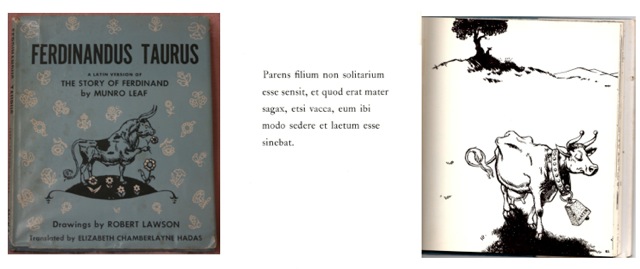
Far from dry and dusty exercise, growing familiarity with Latin is making clear how much of our language and culture (Medicine! Law! Philosophy! Botany! Astronomy! English vocabulary!) are nurtured by Latin (and Greek). It is fun to be able to see the Latin roots glowing behind the English words like ghostly pentimentos, and to be able to understand the grammar behind that little phrase on every coin, ‘E pluribus unum’, (‘Out of many, one’) that is a defining characteristic of the democratic point of view.
Not too long ago, Tim and I finished viewing one of our favorite Teaching Company sets of DVDs, John Hale’s Classical Archaeology of Greece and Rome. I would like to borrow his ending for this post. Professor Hale quotes a Roman architect, Lucer, who built the bridge at Alcántara in the west of Spain, in the old province of Lusitania. This architect created the highest bridge in the empire for the Emperor Trajan in 175 C.E., and also built a temple directly in line with the bridge. On the temple, Lucer inscribed this statement: “Pontem perpetui mansuram in saecula mundi.” (“I have built this bridge to last forever, through the ages of the world.”)
In this age of rapid obsolescence and vanishing pixels, there is something wonderfully comforting about the lasting, solid structures of language, and of Latin in particular.



